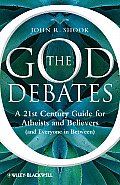John Shook's The God Debates: A 21st Century Guide for Atheists and Believers (and everyone in between) is a stunning addition to the sometimes highly volatile contemporary arguments over God that are so prominent. The author takes a serious in-depth look at just about every argument used by apologists of religion (particularly Christian) and teases them apart, describing how they are constructed, and uncovering the many flaws that make them ineffective.
Shook categorizes arguments for God in the following way:
- Theology from the scripture - arguments for God based on special revelation and apologetics
- Theology from the world - arguments for God derived from the natural world, morality, human experience, and human analogy
- Theology beyond the world - cosmological arguments, teleological arguments, and arguments from the laws of nature
- Theology in the know - Reformed epistemology, foundationalism
- Theology into the myst - arguments based in mysticism, relativism, existentialism, and scriptural interpretation
After surveying each of these and their contributions to the relationship to faith and reason - the big question in the God debates - he argues that the best possibilities for the future development of ethical principles will come from humanism - not secular or religious humanism but ethical humanism. Based on reason and experience and without the what Shook sees as the flawed supernaturalism of religious apologetics, Shook sees ethical humanism as the providing the most hope for grounding of morality in a secular culture.
The God Debates is excellent reading and both Christian apologists and atheists will benefit from this comprehensive analysis. Christian apologists will see how inadequate most of the arguments for God's existence are flawed and the challenges they need to meet if they are going to be persuasive - a very difficult task indeed. And atheists will see a model of scholarly dialogue that avoids the emotive rhetoric of the so-called "New Atheists". They will also gain a deeper understanding of the structure of religious apologetics.
The God Debates is must reading for thinking Christians and thinking atheists. It sets a standard for future dialogue around the existence and nature of God and the role of faith and reason in developing a moral framework for those who do not believe in a supernatural being. It will be challenging for both - but, in particular, Christians (and other religions) are going to have to work very hard to sustain a belief in God in the face of this author's critique. I'll be looking forward to the responses of Christian apologists to this one!


In your post above, you seem to be making an argument for no supreme being. I am a Christian and as such do believe in a Supreme being, but I think of God as an intelligent being. I guess I am having trouble with the fact that I am a thinking person, and have tried to be not so much, because I have always been a question asker, and I am afraid that is a curse.
ReplyDeleteI guess what I am saying I want to embrace my Christian faith as a thinking person, because I don't believe one has to check one's brains at the door, to be a believer, and I guess I would love to communicate with others who think the same way.